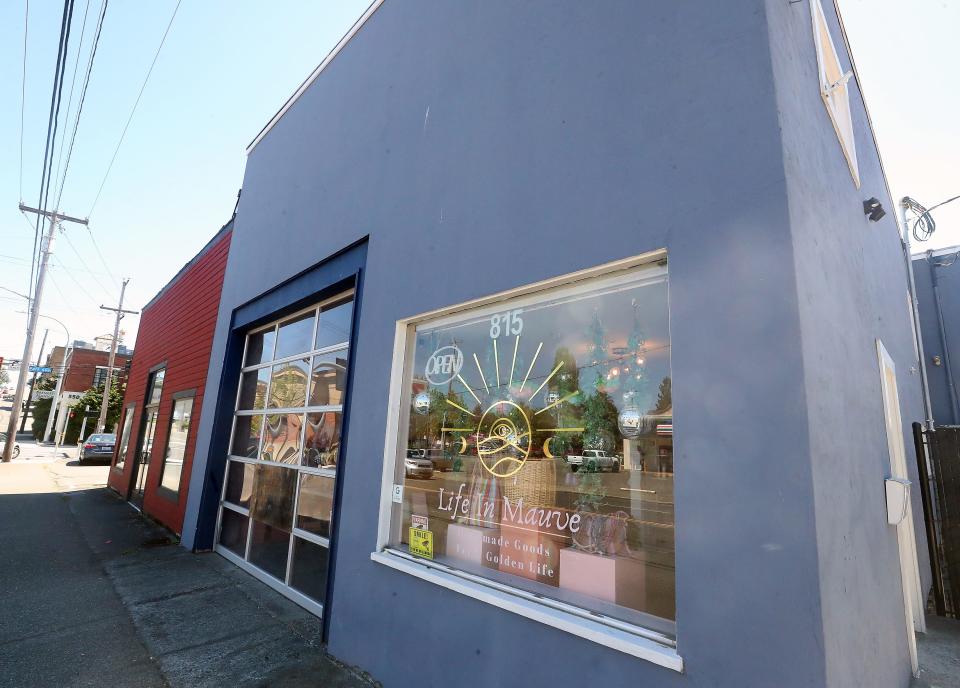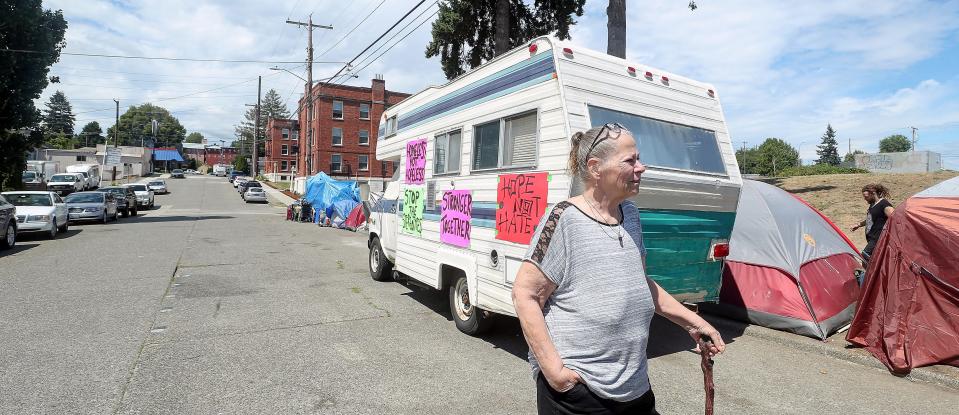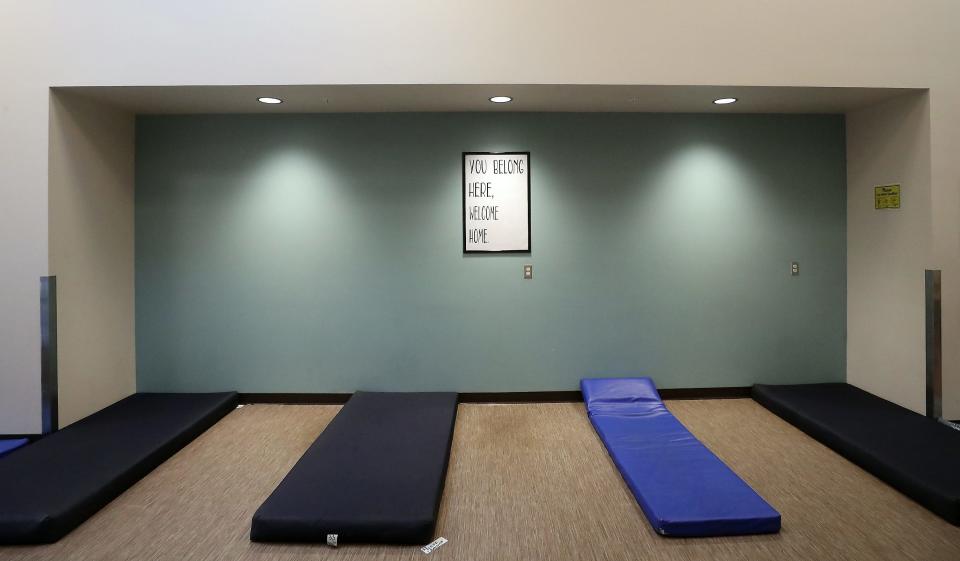On MLK Way, the frustration and futility of trying to address a complex problem

BREMERTON – “I think it started with the straws."
Nayeli Rivera, owner of a small jewelry boutique on Bremerton's 6th Street, suspected that the people coming in to buy glass straws lived in the MLK Way encampment just a block away. When more people began to come into her store, Life in Mauve, to buy straws, Rivera became curious.
Rivera asked one woman about the interest in the glass straws, and was told, “I’ve been back there for three years. We don’t smoke crack, we just do meth.”
Rivera is one of a few business owners and residents who have publicly complained to the Bremerton City Council about a situation that they feel has put their safety at risk this summer. Other residents are concerned that any action that the city takes against the MLK encampment will end up harming the people who live there. Meanwhile, advocates are raising concerns about aggressive behavior from people who don't live in the encampment and drugs that are being forced upon the block.
Over the past few weeks, city council has listened to the public and will now attempt to balance the interests of the community. At a July 5 meeting, several neighbors shared experiences that mirrored Rivera's, dealing with crime or public health risks. At last Wednesday's study session, several councilmembers suggested a version of Lakewood's ordinance, which includes clauses dedicating funds to fighting houselessness, with time, place, or manner restrictions specific to Bremerton. And then at Wednesday's meeting the topic continued to draw interest, with several members of a local organization lobbying in support of the city creating a dedicated place where camping would be allowed, and Mayor Greg Wheeler assured the council and community that plans for a new shelter are in the works.
While the city continues to hear from the community and weigh decisions that may range from new ordinances to new spending to new partnerships, this story is a look at life for people who live on MLK Way, as well as those affected by or serving the encampment.
Citing her family's values, Rivera began to refuse service to people who she thought were using the glass straws for drugs. One day when she turned people away, someone became hostile. Then, trellises were stolen from her storefront and stuffed into a neighbor’s mailbox. At the city council meeting on July 5, she recounted how human feces were splashed in front of the store, all part of the “senseless, little crimes” that may be retaliation for the glass straw incident.
“That’s where a lot of the animosity comes from,” she said. In large part due to these conflicts, Rivera decided to close the store by late August.
One morning last week around 3 a.m., a man kicked through the store's front window and stumbled inside. Nothing was taken, but Rivera no longer felt safe in the store. She moved up the closing date to July 23.

When asked what she thought the city should do, Rivera replied, “I think it’s really complicated." Rivera would like to see more shelters. She would also like the city to be “targeting where the drugs are coming from and the open drug use.”
“I’m not saying that we don’t have empathy for people who are experiencing houselessness," Rivera said. "Of course, it’s — how could you not? However, the people that are there now are causing a lot of violence.”
'Smell the damn blues'
Mama Sharon is the oldest woman living in the MLK Way encampment. She has two grown children and four grandchildren, but when she asked them for support they turned her down.
By way of introduction, Mama Sharon said, “We’re homeless. This is tent city and none of us like it.” At the same time, “This is home to us.”

Mama Sharon is a retired chef, who went to culinary school for three years. “I miss it,” she said.
She wondered why the city doesn’t buy a facility like the old Harrison hospital and empower people to use their skills. She would be happy to cook for her community.
If not a place to live, Mama Sharon said, “Give us toilets, give us that." City council has allocated $10,000 for a toilet, but the administration has not installed one due to concerns about blocking the street. With a temporary closure of the downtown Kitsap Regional Library branch for HVAC work over the coming three months, all nearby public restrooms have closed except for Salvation Army, which is only open from 8 a.m. to 3 p.m. For more than 17 hours, there is no place to relieve oneself except for the street.
“When you’re out here you hold it as long as you can…" Mama Sharon says, "I’ve held it for two days.”
The Salvation Army serves breakfast and lunch, but the people living on MLK Way sometimes rely on volunteers to drop off dinner. Kimmy Siebens, a nurse and founder of the Bremerton Homeless Community Coalition, said that volunteers must be quick and discreet, since the food does not meet sanitation standards set by the county health department if it is not cooked in a restaurant.
On July 5, they had a barbecue. Mama Sharon hadn’t eaten meat in two months. “That tasted so good,” she said.
“We do keep our law and order,” said Mama Sharon. To her, the encampment is a community, a kind of makeshift home. “Where do we get our cigarettes? Well, we bum them from each other… and that’s how we live.”
On July 12, the encampment held a community meeting, where people agreed to try to keep the block clean. Mama Sharon said that about half of the people living in the encampment showed up.
Recently, Mama Sharon had severe chest pain and started yelling for help. Siebens and others called the paramedics, who gave her the medication she needed.
“If she was out hiding somewhere on the fringes, she probably would have just died alone out there,” said Siebens.
Mama Sharon also looks out for others. Recently, a young man came to her crying, thinking he was going to die because his blood sugar levels were too high. As a diabetic, she was able to share insulin with him. Mama Sharon said that salt was the only thing that stabilized him.
“He just turned 20. He has no tent, no sleeping bag,” she said, adding that the young man doesn’t have a family. As a rare treat, Mama Sharon sent a friend to buy him a cake from Safeway.
At one point, Mama Sharon paused: “Smell that smell. That’s fentanyl.” She inhaled.
Mama Sharon said she’s seen kids die on the "blues," referring to cheap fentanyl pills that are prevalent on the block. Kaitlyn MacDonald, an advocate and previously unhoused person, interrupted: “Adam just died. Freakin' Adam.”
Bremerton Fire Chief Patrick McGanney told the Kitsap Sun that his department responded to 23 overdoses throughout the city from May 1 through early July. McGanney emphasized that MLK Way was not the only place where drugs were an issue.
“It is a problem down there. But it is a problem citywide,” said McGanney.
According to Jarrod Moran, every quarter, the HEART team, Kitsap's program for moving individuals from encampments to housing, distributes about 350 doses of Narcan, the substance used to counteract opioid overdoses. From February 2022 to February 2023, the number of overdose deaths increased by 23.94% in Washington, by far the greatest increase in the country.
Mama Sharon addressed the city council and mayor: “Come stay out here with Mama Sharon for a week.”
“Smell the damn blues. Smell the crap we smell,” said Mama Sharon.
The overdose crisis comes home
On April 25, Danielle Clark died from an overdose on MLK Way. She was three weeks shy of her 37th birthday and left behind three young boys. The coroner told her mother, Tammy Clark, that Danielle was one of three overdoses at the MLK Way encampment on that day.
Five years ago, Clark was managing a KFC in West Seattle, said her uncle, Donald Clark.
Then she separated from her partner and moved to Port Orchard. She had two more sons with a new partner. She started using drugs. And she got into a DUI with her oldest son in the car.
“When she lost custody of her children, that’s when she really lost it,” said Tammy Clark.
Danielle became homeless. Over and over, Donald and Tammy Clark brought Danielle to doctors or mental health workers to address the schizophrenia, bipolar disorder, anxiety and drug problems that Tammy Clark said her daughter lived with. They say they were told, “Oh, she’s fine.”
“Guess what… she’s freakin' dead,” said Donald. “I shouldn’t say the system’s broken, but the system’s broken.”
Tammy Clark says she called everyone: probation officers, senator’s offices, mental health workers, county prosecutors. Once when Danielle was arrested, she had fentanyl on her, but the police hadn’t done anything.
Bremerton Police Chief Tom Wolfe said that "legally, there's not a lot we can do" about drug use, citing the state’s Supreme Court 2021 Blake decision that ruled drug possession laws unconstitutional. The Legislature made drug possession a misdemeanor crime, with stipulations that services be offered rather than criminal penalties for an individual's first two offenses.
According to Kitsap County Prosecutor Chad Enright, “that was an unworkable law… there was no way to keep track,” because different police departments use different systems. The practical effect is that Kitsap County has not charged anyone with drug possession in the past few years.
“Get these people help… take the drugs away from them,” said Tammy Clark, who supports stricter drug laws.
After trying everything else, Tammy still hoped that the police would be able to help. Danielle had an outstanding warrant, so the police could arrest her but had stopped actively looking for her. Tammy found Danielle in the MLK Way encampment. When she saw the condition Danielle was in, she walked over to the 7/11 at Sixth Street and Park Avenue and called the police on her.
The police could only keep Danielle for 14 days before releasing her again. A while later, Danielle overdosed on methamphetamine laced with fentanyl.
“I no longer have a daughter. I mean, I have a daughter, but she’s gone now.”
“You’ve watched her grow up since she was a little girl,” said Donald. “I think we did as much as we could try to do.”
“She wasn’t just a drug addict,” said Tammy, “She needed help with her medical conditions, and no one was helping her.”
The family will hold a celebration of life for Danielle on July 30 at Manchester State Park, a place she loved and where she had childhood birthday parties. Clark’s extended family is in the process of adopting her two youngest sons, who had been sent to foster care.
The perspective of trying to help
In the years since the Kitsap Rescue Mission closed its shelter on Sixth Street, the Salvation Army has been the one organization to continually offer services to unhoused people in downtown Bremerton.
In March 2021, Kitsap County asked the Salvation Army to keep its winter shelter open full-time throughout the pandemic. Captain Dana Walters and Captain Lance Walters, who have led the Bremerton organization for five years and have been married for 36, decided that they could do it. Each morning, the staff had to convert the shelter from a sleeping area to its normal services, which include meals, laundry, and social services, and then back again in the evening. Many people using the services would spend the day outside the building's front door or in an alley behind, just off MLK Way.
But on May 1, Salvation Army stopped offering overnight stays, which meant 74 beds, of which 55 were usually filled, were no longer available to Kitsap County’s homeless.

Since the Salvation Army closed their shelter, the Walterses say they’ve noticed an increasing amount of open drug use where the tents and campers have congregated.
“The drug use has always been there, it’s just now the police can’t do anything,” said Dana Walters.
Lance Walters spoke about the stress of rendering aid to people who have overdosed. The morning he was interviewed by the Kitsap Sun, someone had overdosed for the third time in the past few days.
“Thank God, they’re giving out Narcan,” said Dana Walters, who told a story about someone overdosing at 6 a.m. and then coming in for breakfast at a place known as Sally's.
Lance and Dana Walters said that the official tally of overdoses is likely an undercount. People are often revived without anyone calling 911, since Narcan can be administered without medical professionals.
“They’re too good at that job,” Dana Walters said.
In talking with people who come into the Salvation Army, Lance Walters estimated that there have probably been over 20 overdoses on MLK Way over the past two or three weeks.
On the question of long-term solutions, the Walterses deferred to the city. “I would not want to be in the city’s chair,” said Dana Walters.
In the meantime, the Walterses will continue to do what they can to serve unhoused people.
“We care and love people and offer our services,” said Lance Walters, adding that the Salvation Army would be willing to run a shelter or a tiny home village if the city could provide the site and infrastructure.
When asked why religious groups like the Salvation Army were so active in projects on homelessness, Dana Walters replied: “Honestly, Jesus loved the underdog.”
This article originally appeared on Kitsap Sun: Stories from the homeless encampment on MLK Way in Bremerton

